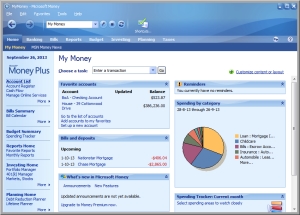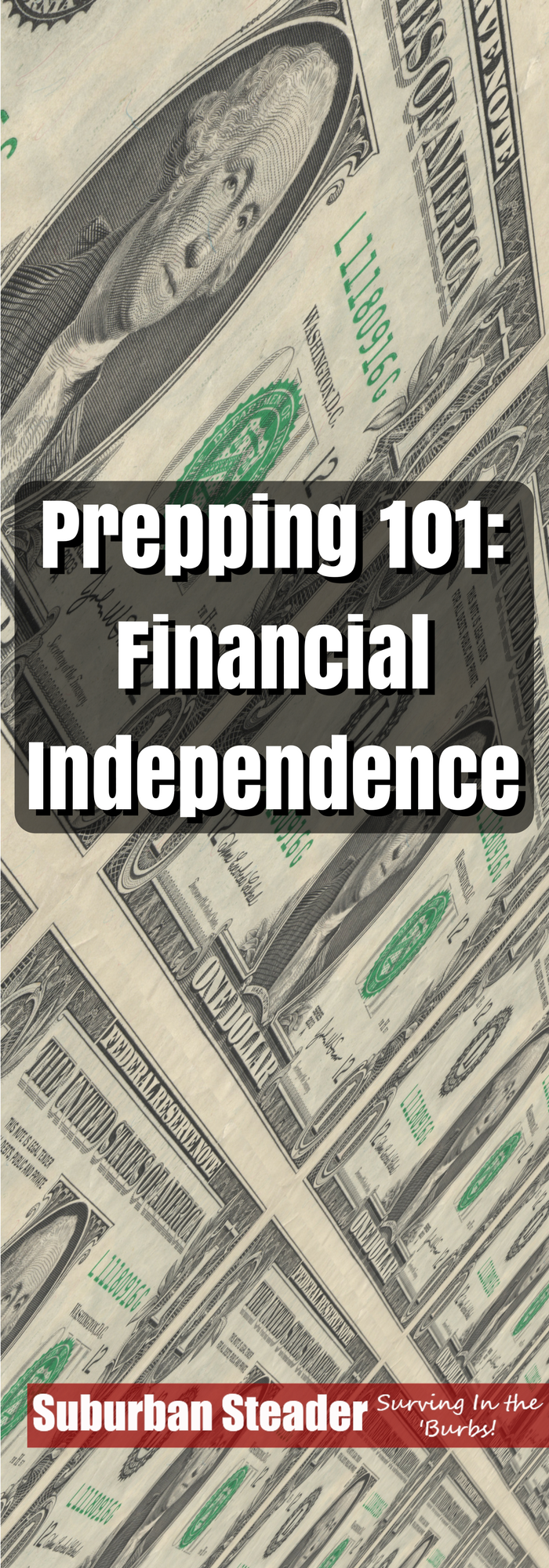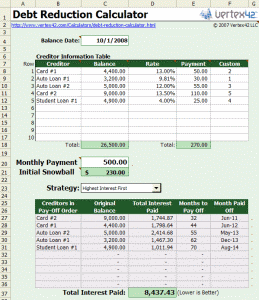Prepping 101: Financial Independence
I want to let you in on a dirty little secret about prepping: it ain’t cheap!
Once you get through your “Oh, crap!” moment, you’re going to do the same thing I did. You’ll realize that there’s a whole lot of action you need to take and a fair amount of things you need to acquire. A lot of these actions and acquisitions require money – money you might not have right now. So, what are you going to do to get started?
Go into debt?
Buy it on credit cards?
WRONG!
You’re going to do the first thing I did – sit down and make a plan to get out of debt. If you do nothing else described in this series, you’ll benefit immensely just by getting out of debt and creating financial independence for your family. Not being handcuffed by the credit card companies and banks will make you breath easier and sleep sounder.
Why My Finances?
Your first thought might be “why should I get my checkbook in shape before I stock up on beans, bullets or band-aids?” The answer is simple: without a solid financial backing, you can’t buy anything. Putting yourself into debt just to ‘be prepared’ is detrimental to your cause. You can have all the food store, medical supplies and firearms you can handle, but you’ll be up a creek without a paddle if spend all your money on preps and can’t afford to pay your mortgage or rent.
Where To Start
The first thing I recommend doing to start getting your finances in order is nothing.
Sound counter-intuitive? It is.
You’re not going to change your spending habits, you’re not going to change your income, you’re not going to change your monthly bills. You’re simply going to track your incomes and expenses for the next three months. Tracking this information lets you find out where your money is coming from and where it’s going.
 How To Track Your Finances
How To Track Your Finances
There are a ton of different ways to track your money.
Some people like the old school method of pencil and paper. And that process works just fine. Write down dates and transactions – incomes and outcomes. At the end of the month, add them up.
Other people, myself included, prefer a slightly more technologically advanced approach. There are many software applications (both freeware and paid) that allow you to track your expenses. We have been using the freeware software Microsoft Money Plus. Yes, it’s Microsoft, but it does a great job of providing a clean interface that allow us to easily track my money. In addition, it allows us to run monthly reports. Plus it’s free – that’s a bonus for this endeavor! You can find it, along with a handful of other free finance tracking software suites, on this site.
Batten Down the Hatches
Now you need to take an honest look at the results of your financial tracking.I’m going to warn you right now – this next step isn’t going to be comfortable.
We spent three months tracking my financial transactions – every paycheck, Dunkin Donut stop and fill up at the gas station. After three months, we was able to generate three monthly reports and get a pretty good snapshot of how we spend our money.
At this point, we could see where we needed to tighten the belt a little. One of our big findings was that we were eating out – ALOT! Those $5 breakfasts, lunch runs and “we’re too tired to cook” dinners were catching up to us. We had a couple of other areas we were unknowingly spending a lot of money.
The next step is to tighten up in your overspending areas. This step will be uncomfortable. Not going out to eat as much as we used to sucked. For instance, I personally felt like I was losing a social aspect of work. Likewise, we felt we worked hard during the week and deserved to go out to a nice dinner on the weekends. But you know what else we found out? We found out we were able to save some money in just a few months. After tightening the belt a bit for a few months, we were starting to see our income trump our expenses for the month (you’re still tracking your finances, right?).
We made a list of our debts – credit cards, loans, mortgages, etc. And we also stumbled upon Dave Ramsey’s Debt Snowball. Spend some time reading up about this approach on your own, but the premise is this:
Pay off the smallest debt first by adding additional monthly payments while still paying your regular monthly payments to all your bills. Then you take the money you were paying monthly on the first bill and tack it onto the payments for the next smallest bill. Once that loan is paid off, you take the money you were paying on the first two loans and attack the third smallest loan with that extra monthly money. And so on, and so on. Essentially you’re paying the same amount every month, but your debt starts to disappear.
We’re in the middle of this process – approaching some of our bigger loans – and can honestly say it works. Dave Ramsey has a pretty good approach to financial security – give him a chance.
Financial Independence – Now What?
So you’ve paid off everything with exception of maybe your mortgage. What do you do now? First – give yourself a giant slap on the back. You’ve done something that most folks don’t think is possible. You’ve used what you have to get out of debt. You can breath easy. You can sleep sound at night. Next – make yourself a promise. Promise yourself that this will NEVER HAPPEN AGAIN! Make smart decisions, don’t finance your wants and live debt free. Now you can prep with an open mind.
You’re probably asking – do I need to take care of my finances before I do any prepping?
The answer is YES…and NO.
First, remember that building up your financial security is a big part of prepping, so don’t overlook it. Second, realize that you can do small things on a daily, weekly and monthly basis to build up your preps. We’ll get into different ideas when we talk about water and food storage. Also, if you can find ways to augment your income, you can justify making a ‘prepping fund’ where you can save money and put it towards prepping. This approach doesn’t strictly follow Dave Ramsay’s advice, but I have found that allowing yourself an occasional ‘reward’ does help you keep on the straight. At least for me, sometimes I need something more than seeing the monthly statements disintegrating before my eyes. Just be sure that your occasional treats don’t overtake your debt reduction process.
I hope you enjoyed this first article on Prepping 101. I am happy to answer any questions in the comments section here or on Facebook. If you don’t want to make your question public, you can always email me at dan AT suburbansteader.com. Keep an eye out for our next Prepping 101 article on identifying what you’re doing that’s working against self-sufficiency.
photo credit: psyberartist via photopin cc

